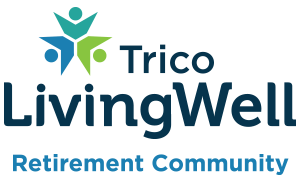Health & Wellness | April 9, 2024
The Link Between Dementia and Vascular Disease
In March, Trico LivingWell had the pleasure of sponsoring and attending ‘Voyage Into Vasculature’, an educational session held by Alzheimer Calgary. This session, led by experts in the field from the University of Calgary, explored the relationship between dementia and vascular health, as well as provided some tips to build resilience and protect both our vascular health and cognition.
What is Vascular Disease?
Vascular disease is a condition that affects your vascular system. Your vascular system is the network of arteries and veins that carry blood all over your body. This system has the important role of sending oxygen and nutrients to body tissues.
Vascular Cognitive Impairment
Your heart and brain are connected by the vascular system. If the vessels leading to the brain are blocked, this results in a lack of oxygen than can damage brain cells. Our brain uses oxygen to perform tasks, and so a lack of oxygen impacts our cognition. As more damage occurs, symptoms like forgetfulness become more severe and lead to problems we associate with dementia, like decisioning making, reasoning, and processing information.
According to a study published in Lancet Neurology, the incidence of dementia is nearly 50 times higher in the year after a major stroke compared to people of the same age who have not had a stroke.
Protecting Your Vascular Health and Cognition
The Heart and Stroke Foundation notes that vascular and mind conditions share many of the same risk factors and strategies for prevention. While there are risk factors out of our control that can impact our vascular health, there are many risk factors that we can mitigate through achievable lifestyle changes. Here are some of the lifestyle risk factors associated with vascular cognitive impairment, and how to combat them, according to The Heart and Stroke Foundation:
Diet
Eating a healthy balanced diet can help reduce the risk of heart disease. Eating more vegetables and fruit, foods higher in fibre, cutting out salt, choosing healthy fats, cutting added sugar, and eating moderate portions are all adjustments that can be made for a healthier diet. Having a healthy diet can also help you manage your weight, which is key for managing blood pressure and cholesterol.
Quit Smoking
The benefits of quitting smoking can be seen through the statistics. According to the Heart and Stoke Foundation:
- Within 5 years, your risk of having a stroke will be almost the same as a non-smoker
- Within 10 years, the risk of dying from lung cancer is cut in half
- Within 15 years, your risk of heart disease is similar to someone who has never smoked
Get Active
For many of us, sitting is a necessary part of our daily routine – whether it’s driving in a car or sitting at a desk for work, inactivity comes easily in the modern world. However, making time for physical activity is an excellent way to dramatically lower your risk of heart disease and stroke, and prevent high blood pressure, high cholesterol, and more. Even something like a brisk 30-minute walk can greatly benefit your health.
Prioritize Wellness
It is clear that by prioritizing our health, we are able to take care of multiple systems in our body that prevent complications in the future. At Trico LivingWell, we take care of our resident’s health through a strong wellness culture that helps to maintain independence.
You can learn more by booking a meeting with us here.
No material on our website is intended to be a substitute for professional medical advice. Always seek the medical advice of your physician or other qualified health care provider when undertaking a new health regimen.

 Book A Visit
Book A Visit Connect with a Lifestyle Leasing Consultant
Connect with a Lifestyle Leasing Consultant
